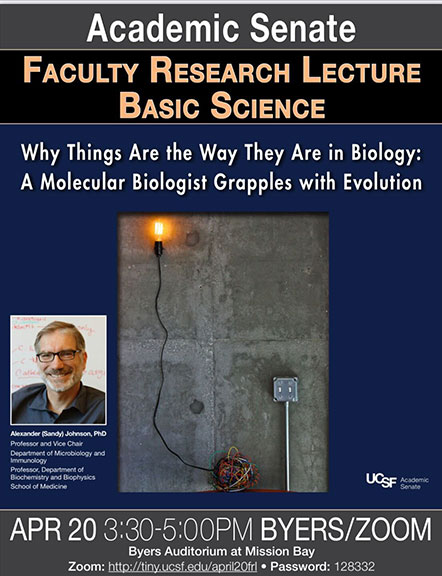 |
| September 2025 - Issue 15 |
| May 2025 - Issue 14 |
| March 2025 - Issue 13 |
| Winter 2024 - Issue 12 |
| Fall 2024 - Issue 11 |
| Fall 2024 - Issue 10 |
| Spring 2023 - Issue 9 |
| Fall 2022 - Issue 8 |
| Summer 2021 - Issue 7 |
| Spring 2020 - Issue 6 |
| Summer 2019 - Issue 5 |
| February 2019 - Issue 4 |
| September 2018 - Issue 3 |
| March 2018 - Issue 2 |
| November 2017 - Issue 1 |
| Introduction |
Spring 2023 - Issue 9
Remarks from the Academic Senate Chair
It has been my privilege and honor to serve as your UCSF Divisional Senate Chair over the past two years. As I approach the end of my term, I am proud of what we have accomplished together, and of our respectful and productive partnership with UCSF leadership. Faculty voices are critical in the exercise of shared governance, as exemplified by recent divisional action to mitigate financial burden on investigators stemming from the United Auto Workers (UAW) agreements and to address lingering effects of the pandemic on research recovery. In that spirit, I extend a warm welcome to two UCSF faculty members who have taken on new roles: Catherine Lucey as Executive Vice Chancellor and Provost (EVCP) and Hal Collard as Vice Chancellor for Research (VCR). I want to thank both leaders for visiting with Senate Executive Council members to discuss their respective visions and priorities.
UAW Agreements. In late December 2022, graduate student researchers (GSRs) and academic student employees or teaching assistants (TAs) at the University of California approved the very first set of UAW contracts. While the agreements will improve the welfare of GSRs and TAs across the system, they also significantly increased costs, especially to PIs at UCSF. Given the paramount need to avoid harm to our academic missions, Senate and administrative leaders formulated and executed a no fuss centralized program to fund agreement-related incremental salary increases for all basic science graduate students and up to three postdoctoral scholars per lab. The payment is designed to cover the period from April 2023 - August 2024, with the following key points:
- Each PI or program will receive $2,400 per basic sciences graduate student.
- Each PI will receive $12,000 per postdoctoral scholar for up to three scholars.
After August 2024, the responsibility for covering the increased salaries will return to the programs/PIs.
While the near-term unanticipated budget gap need is mitigated by the one-time funding program, several long-term issues have come into stark relief against yesteryear models of graduate and postgraduate education. UCSF leadership is moving forward to establish three important committees to address opportunities and challenges in this new era of part-time employee and part-time student academic environment. The Senate looks forward to working with campus leadership on:
- Financial Sustainability: This committee is charged with developing strategies to manage long-term cost increases, including salaries and leave policies. EVCP Catherine Lucey and CFO Mike Clune are chairing this committee.
- Relationship Building: This committee is charged with designing a tiered approach to sustain and advance faculty-learner relationships. Graduate Dean Nicquet Blake and SOM Vice Dean for Research David Morgan are chairing this committee.
- External Funder Advocacy: This committee is charged with encouraging NIH and other funders to increase funding caps, and will be led by Vice Chancellor for Research (VCR) Hal Collard.
Recovery from the Pandemic. On May 11, the Biden Administration formally ended the COVID-19 national emergency and public health emergency declarations. Thankfully, we see many signs around us that the pandemic is indeed waning, despite the fact that COVID remains a concern to many in our community. However, the deleterious impacts from the pandemic on UCSF’s research enterprise, and particularly on individual PIs, may be longer lasting. The systemwide Senate, working with the Office of the President, published the Joint Senate-Administration Mitigating COVID-19 Impacts on Faculty Working Group Final Report. The report highlighted that without appropriate investment, institutional recovery could lag, leading to sunk costs, lost time, and unrealized research benefits. As the country moves into the post-pandemic vantage point, the Senate has initiated a survey to better understand the size and scope of UCSF faculty members’ research support needs arising from the COVID-19 pandemic. Survey data will help the Academic Senate to develop a new COVID Research Recovery Program for our campus.
Bridge Funding. Over the past year or so, the Senate has engaged UCSF leadership on the future of the Chancellor’s Bridge Funding Program, which provides critical support to faculty who are experiencing a gap in research funding. A review of the program revealed it has been underutilized, particularly in the Schools of Nursing and Dentistry. In January 2022, the Senate surveyed the faculty regarding their awareness and use of the Chancellor’s Bridge Funding Program to identify remediable barriers. Discrepancies in program awareness and uptake across Schools were documented. Comments indicated that these discrepancies were driven by a perception that departments and even Schools were unable to contribute the required two-thirds matching funds, split evenly between departments and Schools. With the support of immediate past EVCP Lowenstein, the Chancellor and Deans agreed to address this issue by relaxing the matching requirements such that it may be provided by the department and the School, in any combination. Specific to the School of Nursing, the total matching requirement was reduced to 30%. The School of Dentistry Dean’s Office has committed to provide support for faculty from departments that decline to contribute to Bridge Funding. These responsive changes to faculty concerns demonstrate campus leadership’s shared interest in ensuring that the program funds will be accessible to more faculty. The Senate is pleased the Chancellor has committed to another 5-year cycle (2023-2028) of the Bridge Funding Program.
Diversity. The Senate is deeply committed to promoting diversity, equity, and inclusion (DEI) values and making UCSF the very best place to enjoy a fulfilling career. All standing Senate committees carry out their work with DEI values woven into the fabric of deliberations.
The Committee on Equal Opportunity (EQOP) has been the Senate’s DEI leading voice in recent years. EQOP regularly reports and makes recommendations on issues relating to gender equity, underrepresented minority (URM) faculty, and historically excluded groups at UCSF. EQOP has also played a significant role in advocating for and distributing funds to URM faculty, including sponsorship of more than 40 UCSF faculty to participate in the National Center for Faculty Development & Diversity (NCFDD) Faculty Success Program since 2015. Other initiatives are the promotion of resources and strategies for improving faculty recruitment and retention, and the planned future launch of a communications campaign socializing disability and accommodations resources for UCSF faculty.
As previewed in my last column, the Executive Council endorsed the Committee on Courses of Instruction’s (COCOI) DEI initiative. COCOI regards the thoughtful application of the concepts of DEI, Anti-Oppression, and Anti-Racism (DEI-AO-AR) to courses as both necessary for creating an inclusive learning environment that supports equity among diverse leaners and for fulfilling the institution’s responsibility to serve society-at-large. While not a mandate, the initial focus for this initiative is the application of DEI-AO-AR related concepts into course goals, objectives, content, and design. It follows that course developers consider ways to integrate course, faculty, and learner assessments to the stated goals, objectives, content, and design elements in a way that evaluate learning outcomes of DEI-AO-AR concepts incorporation.
Looking Ahead. The UCSF Academic Senate now has permanent offices sited at the Wayne and Gladys Valley Center for Vision, within earshot of campus administrative leaders for those in-person human encounters that can make a difference when searching for common ground. Executive Director Todd Giedt and Associate Director Alison Cleaver have assembled an exceptionally capable and dedicated team of analysts to support incoming Senate Chair Steve Hetts to further the essential work of the Senate in shared governance. On a personal note, I wish to express heartfelt thanks to the entire Academic Senate staff for steering standing committee leaders and me in constructive ways over the past several years to better faculty life and strengthen community belonging. Sic transit gloria mundi.
An Exclusive Interview with UCSF Executive Vice Chancellor and Provost Catherine Lucey, MD
UCSF announced Catherine Lucey as the new UCSF Executive Vice Chancellor and Provost in November 2022. Dr. Jenny Grandis, Chair, of the UCSF Academic Senate Academic Planning and Budget Committee, recently sat down with Dr. Lucey to hear about her vision and discuss her priorities in this role.
Prior to her new role as EVCP, Catherine R. Lucey, MD served as vice dean for education and executive vice dean of the School of Medicine. She was recruited to UCSF in 2011 while serving as interim dean of medicine at The Ohio State University. Dr. Lucey first joined UCSF as a trainee and was chief resident of internal medicine at San Francisco General Hospital where she learned how UCSF approaches its work.
Dr. Grandis: I just want to congratulate you wholeheartedly on your appointment as the UCSF EVCP. Particularly, as we end this week on International Women's Day, I want to recognize the importance of representation in this role.
You have a deep experience at UCSF. You came here first as a trainee, as a resident, then became a chief resident at San Francisco General Hospital. You returned 20 years later, as the vice dean for education and the executive vice dean of the School of Medicine. Now that you've been back here for about a decade, how do these collective experiences inform your understanding of the EVCP role?
Dr. Lucey: It begins with my residency here in internal medicine. I came here in 1982, right as the HIV epidemic was descending on our communities and causing such incredible suffering and death to so many people. It was a transformative experience for me as it fundamentally changed my understanding of what it means to be in a healthcare profession.
I saw the incredible contributions of biomedical researchers, social scientists, nursing professionals, pharmacists, physical therapists, and dentists as well as physicians. What I learned in that time was the power of science for society, the power of interdisciplinary and inter-scholarly approaches to a tackle a big problem.
It wasn't just the people working on elucidating what the virus was. It was also social scientists to understand what was going on in the community. It was community activists who kept our feet to the fire and who added their own ideas about prevention and supporting people with HIV.
The culture of this place is unique: it's collectivist, it's collaborative, it's curious. Anybody you meet is willing to talk to you if you have an idea, and it doesn't really matter what your background is.
Priorities, Opportunities, Challenges, and Strategies. Dr. Grandis asked Dr. Lucey to describe her priorities as she begins this new role.
Dr. Lucey: I feel like this is an incredible opportunity for me to serve the institution by creating strong infrastructure and operational effectiveness for our core mission areas across all of our schools. I see the role of the office as providing the services, the support, the resources, the technology, and the right policies and procedures, so that our faculty, staff and learners can be buffered from bureaucracy. I want people here to feel that they can concentrate on their work and learning while we handle the rest.
I think there's another opportunity in the Provost Office and that is to ensure that the whole of UCSF is greater than the sum of its parts. Coming out of the pandemic, we realized the importance of the work we do in preparing the workforce that our state needs, and in supporting them with the discovery sciences we need to advance health now and in the future.
Dr. Lucey described some of the challenges facing UCSF including that we operate in many silos. She noted that there is opportunity to promote integration and coordination among researchers, clinicians, and educators both within and across schools and departments.
Dr. Lucey: How will we make sure we're achieving our goal of advancing health worldwide beginning in the Bay Area and moving globally? I think that there's going to be tremendous changes in the next decade in terms of how we deliver care and how we educate, both related to technologic advances and changes in society. And of course, how do we make sure that the fantastic science that's conducted here at UCSF is translated into treatments, discoveries, cures, and gets out into the world.
Dr. Grandis asked Dr. Lucey about her the opportunities and challenges facing UCSF.
Dr. Lucey: I want to divide that into our work internally and our work externally. A key priority in the next five years for UCSF is to figure out the right way of working to keep our faculty, learners, and staff productive and excited. The pandemic was exhausting for everyone, isolating for many, and depressing for some; and I think people are still in recovery from that. And yet the pandemic didn't cause a lot of the problems that people are still struggling with but rather uncovered or exacerbated the issues. I think we should reckon with the fact that many of our work models are outdated.
Dr. Lucey addressed UCSF’s work externally, discussing the opportunity to develop a strategy for advancing health worldwide.
Dr. Lucey: I think we can do more if we work with the Deans, work with the Chancellors, work with the faculty, and our students and residents, who also expect a lot out of us to really think creatively about how we move the needle on that commitment in the next decade, not only as an intellectual goal, but as a commitment to our community.
Dr. Grandis: Thank you for that. So how do we and how do you lead us in managing the growth of UCSF Health in alignment with our core mission and our core values?
Dr. Lucey: I think I'd say that an expanded health system, if we use it to optimize care delivery across the Bay Area in the Northern California area, is part of our core academic mission and part of advancing health worldwide. And we have to make sure that we treat the care delivery in our institutions as an academic mission. What does that mean? It means that we have to make sure that active people or frontline clinicians are recognized, rewarded, and supported as academic faculty. I think too often we don't think of our frontline clinicians as academic and they are hugely academic, and one of the things I would like to work on is making sure that they feel recognized and that they are seen as that by their colleagues.
Cost of Living. Dr. Grandis asked Dr. Lucey about her thoughts on the various challenges associated with the cost of living in the Bay Area.
Dr. Lucey: We can't individually fix the cost of living in San Francisco or the lack of office space but we can as an institution think about how we might adapt. Embracing remote work is a great way that people are trying to accommodate the fact that commuting is expensive. I think there is an opportunity to work with our elected officials to identify creative solutions to provide under market housing for people in different stages of their career.
We have to be prepared to ask every person we recruit what are the biggest challenges you're facing in deciding whether to move here. We have to strive to give equitable support, not necessarily equivalent support. For example, it makes a huge difference recruiting somebody who was first generation to college or whose parents have not built up a lot of wealth by virtue of structural racism or other structural oppressions.
Professional Development. When asked about faculty and staff professional development, Dr. Lucey spoke to the opportunity to create new resources and support services within the EVCP function. She spoke to the importance of inculcating a culture of psychological safety and professional growth.
Dr. Lucey: I think one of the biggest and best investments you can make into people is to give them the opportunity to have some time just to study and learn. Giving people the opportunity to take several days or a week to really think about the next stage of their career is an incredible gift. Sometimes that is supported through professional development funds. Sometimes we have to actually encourage people to take that time.
Dr. Lucey emphasized the role of staff in supporting the University’s mission and the importance of supporting staff well-being and development. “Our staff are incredibly dedicated, have developed a lot of expertise in the work that they do, and many of them had to work daily on site during the pandemic. I want to make sure that we attend to the well-being of staff as well as our faculty and learners.”
Diversity, Equity, Inclusion, and Justice. When Dr. Grandis asked about diversity, equity, inclusion, and justice, Dr. Lucey said she is working toward the type of workforce that supports all.
Dr. Lucey: We want a workforce that incorporates many, many different voices. That's a UCSF way.
Dr. Lucey acknowledged that there is much work ahead. “It's a culture change. It's a global culture change and it requires some different mindsets.” She said change will require asking questions that examine whether the old ways of business still serve their purpose today.
Governance. Dr. Lucey sees the Academic Senate as a fulfilling an important role in the governance of the University because it represents all faculty, from all series, and across all schools.
Dr. Lucey: I'm so proud of the fact that UCSF Academic Senate allows all faculty to vote on local issues.” She added, “it makes me quite proud to be a member.”
When asked about Senate engagement around budget, resources, and planning, Dr. Lucey acknowledged that “the budget is the clearest demonstration of how we view our values.” When offered the opportunity (https://www.amwa-doc.org/helen-burstin-md-mph-macp/unity) to spend money, or think about allocating resources, whether it be fiscal, space, or technology, Dr. Lucey asks, “Is this the highest and best use of this resource?”
Dr. Grandis: Well, I would like to thank you for your time. I can say on behalf of the Academic Senate we are so thrilled that you're in this position and really look forward to working with you.
Dr. Lucey: I'm very happy about that. Thank you so much.
The Committee on Academic Personnel Expands!
During the past decade, the number of UCSF faculty has increased 1.5 times, from around 2,500 to nearly 3,900 faculty members. This growth has been driven by both internal expansions and affiliations with outside institutions. The workload of the Academic Senate Committee on Academic Personnel (CAP) has increased proportionately.
CAP is responsible for reviewing personnel files, and it makes recommendations regarding promotions, appointments, appraisals, changes in series, and some merit actions. CAP also reviews academic personnel policy issues on our campus and at the Systemwide Academic Senate. CAP’s activities are critical to UCSF’s commitment to shared governance. In the 2021-22 academic year, CAP reviewed more personnel files than ever before. The increased workload has created longer wait times for faculty whose files are up for review; some files currently spend up to two months in CAP’s queue.
Recognizing that CAP’s workload will only continue to increase as UCSF continues to expand, the Senate has established two CAPs of equivalent standing with the ratification of Senate Bylaw 110 at the Senate’s Winter Division meeting. Called “Blue CAP” and “Gold CAP” after UCSF’s colors. This change promises to shorten the time that personnel files spend in CAP’s queue. It will also allow each CAP to meet less frequently from May to October, when file volume is typically lower, making it easier for a diverse pool of faculty members to serve on these important committees.
The Senate has established several mechanisms to ensure that the two CAPs apply UCSF’s criteria for advancement and promotion consistently. The current CAP members will be split across the two new committees to providie institutional knowledge and ensure that the new committees’ values are aligned with those of the current CAP. Each year, all CAP members will participate in a joint orientation in September and a joint retreat with the Vice Provost and Associate Deans of Academic Affairs in January or February. The Chairs and Vice Chairs of both committees will meet regularly, and both committees will be supported by the same Senate analyst. The Senate will maintain and monitor data to ensure that the two committees review similar files in the same way.
The changes to CAP’s bylaws to establish Blue CAP and Gold CAP were approved by CAP, the Committee on Committees, the Committee on Rules & Jurisdiction, the Senate Executive Council, and the UCSF Division of the Academic Senate on February 9, 2023, and will go into effect at the start of academic year 2023-2024 on September 1, 2023.
Systemwide Academic Senate and Academic Council Vice Chair Announcement
The San Francisco Division of the Academic Senate is pleased to announce that after almost two years of representing the UCSF Senate at the systemwide Academic Council, our Divisional Chair, Steven W. Cheung, MD, has been appointed by the systemwide Assembly of the Academic Senate to serve as the next systemwide Academic Senate and Academic Council Vice Chair for the 2023-24 academic year! He will become Chair of the systemwide Senate and Academic Council the following year, 2024-25.
Steven’s appointment is the culmination of a long history of Senate service – both local and systemwide. He is a strong proponent of shared governance and his broad Senate committee experience includes the Committee on Research (COR), Academic Planning and Budget (APB), Committee on Committees (CoC), and the Committee on Faculty Welfare (CFW). He is also the recipient of the 2021 systemwide Academic Council Chairs Award for Mid-Career Leadership. Steven said he views his career as both an academic in a medical school, and as an engaged participant in the governance of a great university. “Being part of the Senate is one vehicle to be a part of this great University.” He is passionate about working with people across departments and schools, and participating in systemwide discussions with people from different campuses.
Steven is also an accomplished teacher and researcher, and has demonstrated a commitment to diversity and gender equity throughout his career, perhaps owing to his own immigrant background. Steven is a beneficiary of the Immigration and Nationality Act of 1965. His grandfather came from Hong Kong and became a naturalized US citizen through military service. Following passage of the Act, the Cheung family emigrated to New York City. Steven spent his formative years in the lower east side of Manhattan, working at odd jobs in plumbing, dishwashing, and garment bagging to make money. He attended Dartmouth College and the University of Pennsylvania Medical School, where he focused on auditory neuroscience and Ear, Nose, and Throat (Otolaryngology).
After his arrival at Parnassus, Steven’s residency training involved two years of General Surgery and five years of Otolaryngology with a sub specialization in Neurotology. Steven then connected with his main research mentor Michael M. Merzenich, PhD, Professor Emeritus of Otolaryngology. This launched his research career in the direction of “brain plasticity.” Steven has continued to investigate the mechanisms by which the adult brain can change with learning and experience. Merzenich taught his mentees not to be too fearful of failure, an approach which has long aided Steven in how scientific inquiries are explored. “Mike made progress because he was not paralyzed by the last one percent of the evidence.”
Steven was hired by UCSF in 1994 and -- after initial success with a Veterans Affairs Merit Review grant -- changed series from Adjunct to in-Residence. While academic achievement continued, after having children, his career began to slow down. Steven noticed that institutional support for caregivers was lacking. Steven is pleased that the climate today is much healthier for sustainable work-life balance.
Steven remarked that UC’s model of shared governance is the envy of many faculty at other universities. That said, he admitted that “shared governance is not easy. Some may even call it inefficient. By-and-large you get a much better decision at the end of vigorous deliberations.” Steven has carried out Senate duties with an eye for implementable actions rooted in constructive shared governance. “When the Senate take positions that are not at all practical or not at all acceptable, our influence diminishes.”
Steven is in good company as he takes on this systemwide leadership role. Steven joins a select group of past systemwide Senate Vice Chairs/Chairs from UCSF – Mary Croughan (2007-09), Larry Pitts (2002-04), Sandra Weiss (1996-98), and Francis Sooy (1968-70).
Campus Events & Faculty Honors
Over the past year, the Senate has also been very active in sponsoring and hosting events of interest to faculty:
- Faculty Research Lecture: The Academic Senate announced Alexander (Sandy) Johnson, PhD, as recipient of the Sixty Fifth Annual Faculty Research Lectureship in Basic Science for his work on evolutionary mechanisms in gene regulation. The lecture, “Why Things Are the Way They Are in Biology: A Molecular Biologist Grapples with Evolution” took place on Thursday, April 20, 2023, from 3:30 p.m. - 5:00 p.m. in Byers Auditorium at Mission Bay Campus with a reception to follow. This event is posted on the Academic Senate YouTube channel and the website.
- 2023 Academic Senate Distinguished Faculty Awards for Distinction in Teaching and Distinction in Mentoring: The UCSF Academic Senate announced the Spring 2023 Distinguished Faculty Awards for Distinction in Teaching and Distinction in Mentoring Award winners for the hybrid event on Monday, May 15th, 2023, from 3:00 p.m. to 5:00 p.m. The recipients are:
- Sara Whetstone, MD, MHS - Academic Senate Distinction in Teaching Award for faculty at UCSF for more than five years.
- Barbie Klein, PhD - Academic Senate Distinction in Teaching Award for faculty at UCSF for five years or fewer.
- Marina Tolou-Shams, PhD - Academic Senate Distinction in Mentoring Award for faculty at the rank of Full Professor.
- Jennifer Lai, MD, MBA - Academic Senate Distinction in Mentoring Award for faculty at the rank of Associate Professor.
- Andrea Jackson, MD, MAS - Academic Senate Distinction in Mentoring Award for faculty at the rank of Associate Professor.
- From Carbon Neutrality to Decarbonization - UCSF Opportunities: Academic Senate Sustainability Committee Town Hall: This town hall explored several topics, including: updates from the Sustainability Committee, ways to get involved at UCSF, electrification progress, and transportation alternatives. This event is posted on the Academic Senate YouTube channel and the website.
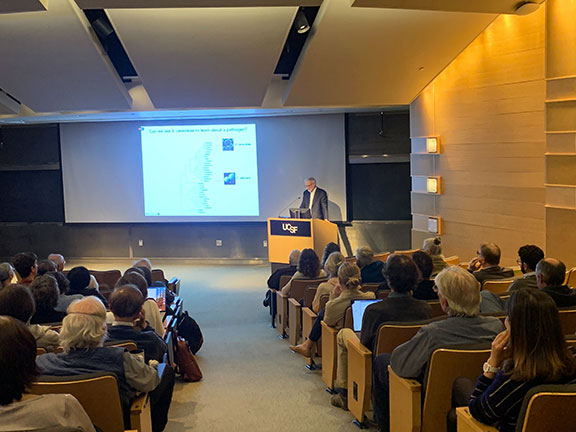
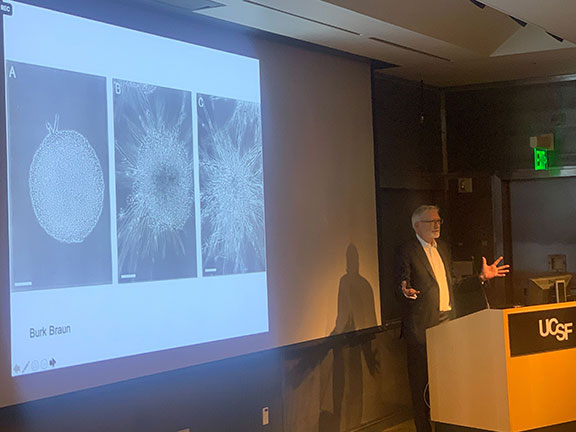
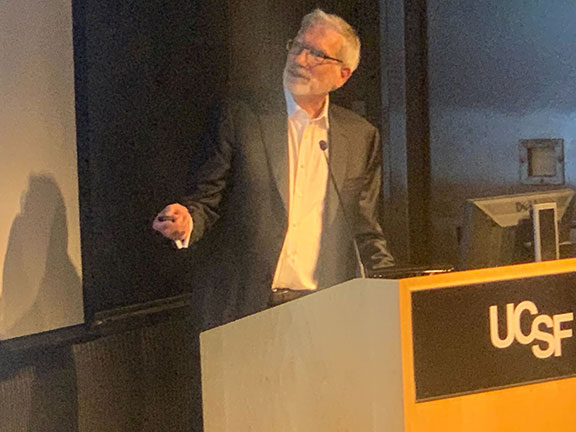
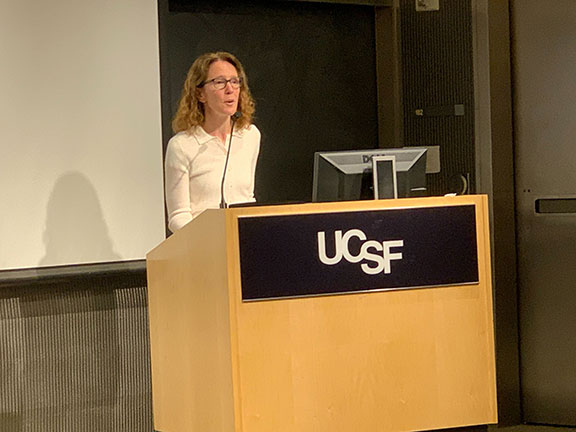
UCSF Joins UC Open Access Agreement with Wiley
The Committee on Library & Scholarly Communication (COLASC) applauds that UCSF is now included in the University of California's expanded open access agreement with Wiley, one of the worlds largest publishers. Under the 2023 agreement, the UC libraries will automatically pay the first $1,000 of the open access fee, or article processing charge (APC), for UCSF authors in any of Wiley’s journals. The libraries will pay the entire APC for authors who wish to make their work freely available but do not have research funds available. Read more >>
Created by UC Board of Regents Standing Order 105, the UC San Francisco (UCSF) Academic Senate is empowered to exercise direct control over such academic matters as admissions for degrees and curricula, which are of central importance to the University. The UCSF Division of Academic Senate provides an independent forum to discuss faculty-related campus wide academic concerns. In other areas, the Senate exercises an active advisory role. The Academic Senate works within the larger body of UCSF, a leading university dedicated to promoting health worldwide through advanced biomedical research, graduate-level education in the life sciences and health professions, and excellence in patient care.

